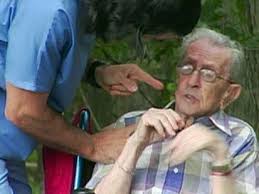 According to national statistics, about six million older adults are abused each year. That amounts to almost one of every ten adults over the age of 60 who have been physically, sexually, emotionally or financially exploited. If you are a caregiver to an older adult, be alert to someone in their home, in their community or on staff in their nursing home who may be an abuser. The statistics suggest that nearly two thirds of the reported cases of elder abuse are instances of an adult child or spouse of the older person who is the abuser. How do you know if your older loved one is being abused?
According to national statistics, about six million older adults are abused each year. That amounts to almost one of every ten adults over the age of 60 who have been physically, sexually, emotionally or financially exploited. If you are a caregiver to an older adult, be alert to someone in their home, in their community or on staff in their nursing home who may be an abuser. The statistics suggest that nearly two thirds of the reported cases of elder abuse are instances of an adult child or spouse of the older person who is the abuser. How do you know if your older loved one is being abused?
The challenge in spotting abuse is that abuse can take any number of forms. At the most general level, look for changes in your older adult’s personality or behavior, especially their tendency to argue, their tension or irritability. Regarding the specific signs of specific types of abuse:
- Emotional abuse – Behavior that can be mistaken for dementia like mumbling, thumb-sucking or rocking actually are self-soothing behaviors of an abused elder. Look closely to the dynamic between the elder and any caregiver who seems belittling or minimizing to the elder.
- Physical abuse – Look for bruises, abrasions or welts, especially if they are on both sides of the body which suggest some kind of external restraint. Be wary of explanations of bruises or broken bones being the result of the elder’s falls or clumsiness. Be on the lookout for the caregiver who seems never to be out of ear shot, suggesting a fear of being discovered. You may also see torn clothing, broken glasses or other signs of physical excesses.
- Sexual abuse – Be wary if your loved one’s front door being unlocked or other signs that they are not secure in their house or apartment. More important are the signs of bruising around their genitals or breasts or vaginal or anal bleeding. As with more general physical abuse, be suspicious of torn or bloody clothing, especially undergarments.
- Financial abuse – First, appreciate that if an older adult has been defrauded by one of the many internet or telephone exploiters, they may be ashamed to admit it. Look for large withdrawals or checks or charges and the purchase of unnecessary services or goods. Be suspicious of changes in wills or titles for property and cars. Be aware of any cash, jewelry, artwork or other valuables that suddenly go missing.
- Neglect – Neglect can be self-inflicted or imposed by a third party. Be sensitive to signs they are not eating or drinking sufficiently or if they are poorly or insufficiently clothed. Let your nose lead the way; are they not bathed regularly, or are soiled adult diapers or garbage accumulating?
We have only scratched the surface, but it comes down to being aware of any changes for the worse. If you are a distance caregiver and cannot be present, engage someone local who can be your eyes and ears (and nose).
Charlotte Bishop is a Geriatric Care Manager and founder of Creative Case Management, certified professionals who are geriatric advocates, resources, counselors and friends to older adults and their families in metropolitan Chicago. Please email your questions to ccbishop@creativecasemanagement.com.



